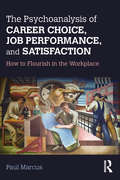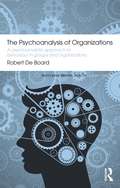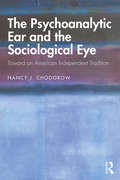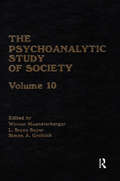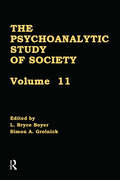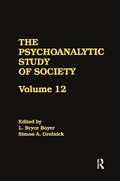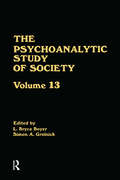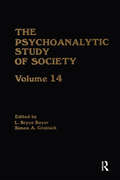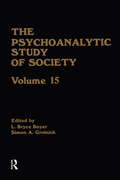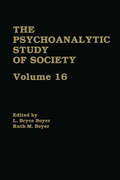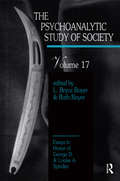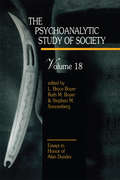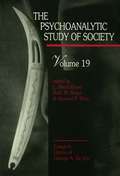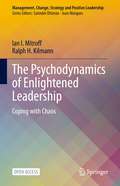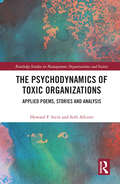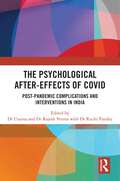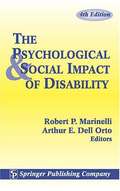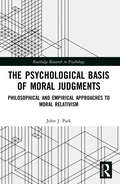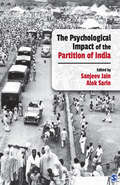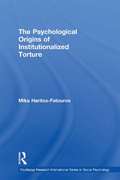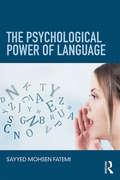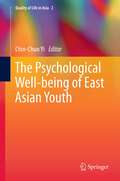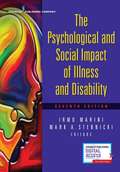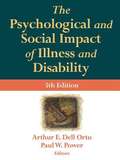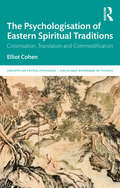- Table View
- List View
The Psychoanalysis of Career Choice, Job Performance, and Satisfaction: How to Flourish in the Workplace
by Paul MarcusFreud said that "love and work" are the central therapeutic goals of psychoanalysis; the twin pillars for a sound mind and for living the "good life." While psychoanalysis has masterfully contributed to understanding the experience of love, it has only made a modest contribution to understanding the psychology of work. This book is the first to explore fully the psychoanalysis of work, analysing career choice, job performance and job satisfaction, with an eye toward helping people make wiser choices that bring out the best in themselves, their colleagues and their organization. The book addresses the crucial questions concerning work: how does one choose the right career; what qualities contribute to excellence in performance; how best to implement and cope with organizational change; and what capacity and skills does one need to enjoy every day work? Drawing on psychoanalytic thinking, vocational counseling, organizational psychology and business studies, The Psychoanalysis of Career Choice, Job Performance, and Satisfaction will be invaluable in clinical psychoanalytic work, as well as for mental health professionals, scholars, career counselors and psychologists looking for a deeper understanding of work-based issues.
The Psychoanalysis of Organizations: A psychoanalytic approach to behaviour in groups and organizations (Routledge Mental Health Classic Editions)
by Robert De BoardOne of the most pressing needs of modern society is to understand and construct organizations that are not only effective in terms of carrying out work but that also allow and encourage people to develop their full human potential. Psychoanalytic theory describes those primary processes that lie at the heart of human activity and provides new insights for understanding group and organizational behaviour. With a new introduction written by Vega Roberts, this Classic Edition of The Psychoanalysis of Organizations presents the theories of Sigmund Freud, Melanie Klein, Wilfred Bion, Elizabeth Lewin and Eric Menzies in plain language and shows their relevance to normal working life. First published in 1978, Robert De Board takes a wide-ranging overview of the major psychoanalytic theorists and organizational researchers, and analyses how the two groups can work together. Written in a very accessible style, it makes sophisticated psychoanalytic and management concepts comprehensible and usable for anyone.
The Psychoanalytic Ear and the Sociological Eye: Toward an American Independent Tradition
by Nancy ChodorowIn The Psychoanalytic Ear and the Sociological Eye: Toward an American Independent Tradition, Nancy J. Chodorow brings together her two professional identities, psychoanalyst and sociologist, as she also brings together and moves beyond two traditions within American psychoanalysis, naming for the first time an American independent tradition. The book's chapters move inward, toward fine-tuned discussions of the theory and epistemology of the American independent tradition, which Chodorow locates originally in the writings of Erik Erikson and Hans Loewald, and outward toward what Chodorow sees as a missing but necessary connection between psychoanalysis, the social sciences, and the social world. Chodorow suggests that Hans Loewald and Erik Erikson, self-defined ego psychologists, each brings in the intersubjective, attending to the fine-tuned interactions of mother and child, analyst and patient, and individual and social surround. She calls them intersubjective ego psychologists—for Chodorow, the basic theory and clinical epistemology of the American independent tradition. Chodorow describes intrinsic contradictions in psychoanalytic theory and practice that these authors and later American independents address, and she points to similarities between the American and British independent traditions. The American independent tradition, especially through the writings of Erikson, points the analyst and the scholar to individuality and society. Moving back in time, Chodorow suggests that from his earliest writings to his last works, Freud was interested in society and culture, both as these are lived by individuals and as psychoanalysis can help us to understand the fundamental processes that create them. Chodorow advocates for a return to these sociocultural interests for psychoanalysts. At the same time, she rues the lack of attention within the social sciences to the serious study of individuals and individuality and advocates for a field of individuology in the university.
The Psychoanalytic Study of Society, V. 10
by Werner Muensterberger, L. Bryce Boyer and Simon A. GrolnickFirst published in 1983. Volume 10 of the Psychoanalytic Study of Society papers. with essays on anthropology, religion, history, literature, and music.
The Psychoanalytic Study of Society, V. 11: Essays in Honor of Werner Muensterberger
by L. Bryce Boyer and Simon A. GrolnickVolume 11 includes chapters on the analysis of dybbuk possession and exorcism in Judaism (Y. Bilu); crisis and continuity in the personality of an Apache shaman (L. B. Boyer et al.); culture shock and the inability to mourn ( H. Stein); charismatically led groups (L. Balter); the psychoanalytic and social aspects of telephoning (R. Almansi); and an ethnographic study of hermaphroditism ((G. Herdt & R. Stoller).
The Psychoanalytic Study of Society, V. 12: Essays in Honor of George Devereux
by L. BRYCE BOYER; SIMON A. GROLNICKVolume 12 includes chapters on the hermeneutics of structuralism and psychoanalysis (H. van Velzen); prophetic initiation in Israel and Judah (D. Merkur); the cult phenomenon and the paranoid process (W. Meissner); the ego and adaptation (P. Parin); male adolescent initiation rituals (L. Rosen); gender identity in a New Guinea people (E. Foulks); and the film Cabaret (S. Bauer).
The Psychoanalytic Study of Society, V. 13: Essays in Honor of Weston LaBarre
by L. Bryce Boyer Simon A. GrolnickVolume 13 includes chapters on the contributions of Weston LaBarre (B. Kilbourne); Geza Roheim's theory of myth (S. Morales); the origins of Christianity (W. Meissner); myths in Inuit religion (D. Merkur); the psychology of a Sherpa shaman (R. Paul); the psychoanalytic study of urban legends (M. Carroll); and the dogma of technology (H. Stein & R. Hill).
The Psychoanalytic Study of Society, V. 14: Essays in Honor of Paul Parin
by L. Bryce Boyer Simon A. GrolnickVolume 14 includes chapters on the psychoanalysis of political commitment (P. Parin); Jews and homosexuals as strangers (P. Parin); the analogous tasks of the psychoanalyst and the ethnographer (M. Gehrie); cultic elements in early Christianity (W. Meissner); Jewish apocalyptists (D. Merkur); creationist resistance to evolution (R. Graber & L. McWhorter); sacred objects and transitional phenomena in aboriginal Central Australia; and a review of the contributions of Paul Parin (D. Freeman).
The Psychoanalytic Study of Society, V. 15: Essays in Honor of Melford E. Spiro
by L. Bryce Boyer Simon A. GrolnickVolume 15 features Melford Spiro's "Culture and Human Nature" and "The internalization of Burmese Gender Identity" along with an interview of Spiro by B. Kilbourne and S. Bolle. Additional topics include children's fantasy life in Papua New Guinea (F. Poole); a psychoanthropological approach to Kagwahiv food taboos (W. Kracke); an ethnological and Rorschach study of three groups of Australian aborigines (R. Boyer et al.); a consideration of the "trickster" in relation to issues of sublimation and psychosocial development; and a review of Bettelheim's contribution to anthropology (R. Paul).
The Psychoanalytic Study of Society, V. 16: Essays in Honor of A. Irving Hallowell
by L. Bryce Boyer Ruth M. BoyerVolume 16 offers appreciations of A. Irving Hallowell by M. Spiro, R. Fogelson, and E. Bourguignon. Additional topics include Kagwahiv dream beliefs (W. Kracke); experiences of the self in Papua New Guinea (F. Poole); house design and the self in an African culture (R. & S. LeVine); circumcision and biblical narrative (M. Lansky & B. Kilborne); and cultic elements in early Christianity (W. Meissner).
The Psychoanalytic Study of Society, V. 17: Essays in Honor of George D. and Louise A. Spindler
by L. Bryce Boyer Ruth M. Boyer Stephen M. SonnenbergIn Volume 17, a series of critical appreciations of George and Louise Spindler's multidisciplinary contributions focus on homogeneity and heterogeneity in American cultural anthropology (S. Parman); the molding of American anthropology (M. Suarez); education (H. Trueba); and the uses of projective techniques in the field (R. Edgerton & G. DeVos). Additional topics include the primary process (M. Spiro); psychotherapy and culture (L. Bloom); unconscious aspects of the Arab-Israeli conflict (A. Falk); and medieval messianism and Sabbatianism (W. Meissner).
The Psychoanalytic Study of Society, V. 18: Essays in Honor of Alan Dundes
by L. BRYCE BOYER, RUTH M. BOYER AND STEPHEN M. SONNENBERGOpening with a critical appreciation of Alan Dundes (M. Carroll) and Dundes's own cross-cultural study of the cockfight, Volume 18 includes chapters on psychoanalysis and Hindu sexual fantasies (W. Doniger); the modern folk tale "The Boyfriend's Death" (M. Carroll); a gruesome Eskimo bedtime story (R. Boyer); the homosexual implications of Argentinean soccer (M. Suarez-Orozco); and the symbolism of a Malaysian religious festival (E. Fuller).
The Psychoanalytic Study of Society, V. 19: Essays in Honor of George A. De Vos
by L. Bryce Boyer Ruth M. Boyer Howard F. SteinCritical appreciations of George A. De Vos, a pioneer in the cross-cultural application of projective techniques (M. Suarez-Orozco, P. Lerner), and De Vos's own reminiscences, are followed by contributions true to the spirit of De Vos's methodology. They include a demonstration of the usefulness of projective tests in the psychodiagnostic evaluation of schizophrenia (J. Stone, P. Wilson & B. Boyer); an examination of the role of historical events in the development of Chinese and Japanese personality characteristics (J. Connor); a review of the impact of Freudian and Jungian thought in India (S. Kakar); and a study of loss and grief in a community of the North American Great Plains (H. Stein).
The Psychodynamics of Enlightened Leadership: Coping with Chaos (Management, Change, Strategy and Positive Leadership)
by Ian I. Mitroff Ralph H. KilmannThis open access book provides a comprehensive look at the pluses and minuses of leadership in times of an unparalleled crisis, such as the COVID-19 global pandemic. It examines the COVID-19 crisis in terms of psychodynamics, crisis management, and especially from the standpoint of complex, messy systems. It analyses how leaders need to think and act differently to cope better with—and potentially prevent—future crises.
The Psychodynamics of Toxic Organizations: Applied Poems, Stories and Analysis (Routledge Studies in Management, Organizations and Society)
by Seth Allcorn Howard F. SteinUnderstanding experience at work, especially in toxic organizations, is a multidimensional undertaking that must include all senses. The use of applied poetry has its primary value as an evocative approach to sensing, knowing, and understanding workplace experience. Poetry at its best condenses into relatively few words, metaphors, and images what conventional social science narratives would take much longer to articulate. Where poetry often hints and alludes, narrative seeks to spell out, expound, and complete. Where poetry leaves much mental space for the listener or reader to fill in with one’s imagination, narrative fills in the spaces with rich detail. Applied poetry and its contextual stories offer a way of accessing workplace experience that is unique and valuable in terms of understanding lives at work. The use of complementary psychodynamic theories, like all theories, is a way of trying to account for what we have found and experienced and in particular why it happened. "Why," the authors suggest, is critical in terms of understanding the sensing, images, and metaphors evoked by the poetry and stories that may resonate with hearers and readers for reasons that are unconscious and are rooted in the past. These transferences that come forward from life experience into the present are the critical data we work with. These are the data of psychoanalysis. This book both widens and deepens the scope of organizational research offered by other researchers, theorists, and approaches to understanding, interpreting, explaining, leading, and consulting with workplace organizations. Its triangulating integration of applied poetry, experience and stories behind the poetry, and the three psychoanalytic models of explaining life in workplaces, is a new and distinct contribution to organizational research, leadership, and consulting efforts to help organization members solve real, underlying problems and not offer simplistic, formulaic solutions based solely on a study of the organization’s surface. It will be of interest to researchers, academics, and students in the fields of organizational studies, leadership, and management.
The Psychological After-Effects of Covid: Post-Pandemic Complications and Interventions in India
by Rajesh Verma Dr Uzaina Ruchi PandeyThis comprehensive resource provides a one-stop information repository, exploring all psychological aspects of Covid-19. It documents the after-effects of the Covid pandemic, and how it transformed India as a society and its citizens as individuals. The book covers the psycho-social impact on society and individuals and our collective behaviour, as well as coping strategies and interventions and how lessons learned will help in preparedness for the future.Including case studies and the latest research, this book examines how psycho-social paradigms changed as a result of the pandemic, and left their watermark on the human psyche. It also explores the coping strategies adopted to deal with this common aggressor and how the techniques varied in accordance with social, cultural and geographical factors. The final chapters offer new insights for the future, highlighting the psychological infrastructure required, the type of preparedness and handling strategies necessary to mitigate the impact of any future biogenic pandemics.Combining theory and practical application, it will be valuable reading for academics and researchers as well as practising psychologists, clinical psychologists, and law-makers who are concerned with mental health.
The Psychological And Social Impact Of Disability
by Arthur E. Dell Orto Robert P. MarinelliMarinelli and Dell Orto continue the premise of their earlier editions of this widely adopted text and present a realistic perspective on disability. Carefully selected articles and personal narratives capture the unique aspects of the psychological and social effects of disability. Formatted to include thought-provoking study questions and disability awareness exercises, this text is recommended for students in rehabilitation counseling and physical therapy education programs, as well as professionals in rehabilitation, psychology, and social work.
The Psychological Basis of Moral Judgments: Philosophical and Empirical Approaches to Moral Relativism (Routledge Research in Psychology)
by John J. ParkThis volume examines the psychological basis of moral judgments and asks what theories of concepts apply to moral concepts. By combining philosophical reasoning and empirical insights from the fields of moral psychology, cognitive science, evolutionary psychology, and neuroscience, it considers what mental states not only influence, but also constitute our moral concepts and judgments. On this basis, Park proposes a novel pluralistic theory of moral concepts which includes three different cognitive structures and emotions. Thus, our moral judgments are shown to be a hybrid that express both cognitive and conative states. In part through analysis of new empirical data on moral semantic intuitions, gathered via cross-cultural experimental research, Park reveals that the referents of individuals’ moral judgments and concepts vary across time, contexts, and groups. On this basis, he contends for moral relativism, where moral judgments cannot be universally true across time and location but only relative to groups. This powerfully argued text will be of interest to researchers, academics, and educators with an interest in cognitive science, moral theory, philosophy of psychology, and moral psychology more broadly. Those interested in ethics, applied social psychology, and moral development will also benefit from the volume.
The Psychological Impact of the Partition of India
by Sanjeev Jain Alok SarinThe first of its kind, this book studies the psychological impact of Partition through medical and psychiatric perspectives. The Partition of India was a partitioning of minds as much as it was a geographical division. But there has been little discussion in mental health discourse on the psychological scars it caused. This book examines the partitioning of human experience and its impact on social life and psychological health. The chapters track, through various approaches, the breakdown of civic life and society during the cataclysmic event, the collapse of medical services, the violence against citizens and the reflection of these events in writings of that era. The book draws attention to the urgent need for a humane understanding of persons with mental illness and psychological distress in the context of their lived history as much as their sociocultural identities and roots.
The Psychological Origins of Institutionalized Torture (Routledge Research International Series in Social Psychology #No.4)
by Mika Haritos-FatourosOriginal research, including interviews with former Greek torturers, is supplemented by discussion of former studies, military records and other sources, to provide disturbing but valuable insights into the psychology of torture. The book describes parallel situations such as the rites of passage in pre-industrial societies and cults, elite Corps military training and college hazing, eventually concluding that the torturer is not born, but made.Of essential interest to academics and students interested in social psychology and related disciplines, this book will also be extremely valuable to policy-makers, professionals working in government, and all those interested in securing and promoting human rights.
The Psychological Power of Language
by Sayyed Mohsen FatemiThis volume shows how the psychology and power of language can create realities. It examines the psychological implications of language as a way of being and not just as an instrument of communication. It discusses how a shift in language gives rise to an existential transformation, and shows how creative modes of expression lead to a radical transformation of beings. Throughout, both the theoretical and practical implications of the psychological power of language are presented, particularly how language may result in a healthier inter- and intrapersonal world. It will interest upper-level students and researchers of language in Psychology, Linguistics, Philosophy and Education, as well as professional counselors.
The Psychological Well-being of East Asian Youth
by Chin-Chun YiThe rapid social change in the East Asia has brought great research attention on the family, education and political impacts. The growth trajectory of the next generation is exposed to an entirely different context owing to the dual effects of traditional and modern values as well as practices. This book provides an overall picture of the developmental trajectory of Taiwanese youth as a typical example in the region. The time frame is set from early adolescence (13years old) to young adulthood (22yeard old). Individual psychological well-being in its broad definition will be used as the outcome indicator to reflect significant developmental processes during this important transitional life course. Benefitted from the rare panel datasets conducted from 2000-2009, this book has two major focuses: one is to explore the interplay among family, school and community with regard to their influence on the individual growth patterns; the other is to highlight the potential constraint and/or strength of the prevailing social norms and values shared among East Asian societies. To be specific, different chapters will describe and analyze the life chances and growth patterns among youth with different social capitals (including family SES, educational achievement, rural-urban residence, etc.). Their short-term versus long-term outcome, as indicated by various psychological well-being variables (e.g., depressive symptoms, deviant or problem behaviors, happiness, edutional performance), will allow us to delineate the particular structural context that individual East Asian youth encounters and to offer constructive suggestions on family interaction, educational strategy as well as health related policies based on the scientific evidence. This book incorporates comparative reports from other East Asian societies, and from youth panel studies of Australia and the U.S.. The experience of their counter-part in the advanced societies will contribute to readers' understanding of the particular social situation that East Asian youth is embedded in the growth process. In addition, comparative perspective will enable the reader to contemplate on the potential future development of the affluent generation in the region. Since changing social structure occurred in the last few decades in the East Asia has suffered inadequate investigation in the realm of family, education and community, this book provides timely information to fill up the gap. Analyses of the valuable dataset from early adolescents to young adults will attract those who are interested in family researches, in youth studies, in panel data analyses, as well as in the social development in Taiwan and in East Asia.
The Psychological and Social Impact of Illness and Disability
by Irmo Marini Mark A. StebnickiNow in its seventh edition, this bestselling classic continues to be the most comprehensive and diverse text available on the psychosocial aspects of illness and disability. It is substantially revised to reflect the growing disparity between the haves and the have-nots and incorporates social justice issues throughout the text. In addition to new and updated information integrated throughout the book, the seventh edition features two new chapters addressing social justice in regards to depression and disability, and the psychosocial aspects of grief, death, and dying. Additionally, the text now includes an Instructor’s Manual and PowerPoint slides. Combining a mix of seminal work from rehabilitation counseling legends with current theoretical and treatment approaches, the book provides a practical, real-life perspective and offers broad and inclusive coverage of the day-to-day challenges of working with a diverse and marginalized population. Additionally, the text analyzes barriers to enabling patients with disabilities and improving their quality of life. Chapter objectives, review questions, and personal narratives in each chapter facilitate in-depth learning.
The Psychological and Social Impact of Illness and Disability (5th Edition)
by Paul W. Power Arthur E. Dell OrtoThis collection, which defines disability very broadly to include post-traumatic stress and normal aging, includes classic articles and discussion questions as well as new material on illness. With a few exceptions it concentrates on the needs of caregivers and those who seek to rehabilitate people with disabilities. Therefore articles cover such issues as definitions of disability and current or past models, shifts in expectations of care demanded by the disabled, perceptions of stages of adjustment to disability, differences in the experience of men and women, the difficulties in discerning the quality of life from outside disability, sexuality, methods of intervention and treatment to promote acceptance o a disability, family issues surrounding life and death, special resources such as assistive technology and spirituality, new applications of eugenics and euthanasia, and "quality aging." Includes exercises and narratives about disability, primarily by caregivers.
The Psychologisation of Eastern Spiritual Traditions: Colonisation, Translation and Commodification (Concepts for Critical Psychology)
by Elliot CohenThis essential book critically examines the various ways in which Eastern spiritual traditions have been typically stripped of their spiritual roots, content and context, to be more readily assimilated into secular Western frames of Psychology. Beginning with the colonial histories of Empire, the author draws from the 1960s Counterculture and the subsequent romanticising and idealising of the East. Cohen explores how Hindu, Buddhist and Daoist traditions have been gradually transformed into forms of Psychology, Psychotherapy and Self-Help, undergoing processes of ‘modernisation’ and secularisation until their respective cosmologies had been successfully reinterpreted and reimagined. An important component of this psychologisation is the accompanying commodification of Eastern spiritual practices, including the mass-marketing of mindfulness and meditation as part of the burgeoning well-being industry. Also presenting emerging voices of resistance from within Eastern spiritual traditions, the book ends with a chapter on Transpersonal Psychology, showing a path for how to gradually move away from colonisation and towards collaboration. Engaging with the ‘mindfulness movement’ and other practices assimilated by Western culture, this is fascinating reading for students and academics in psychology, philosophy and religious studies, as well as mindfulness practitioners.
